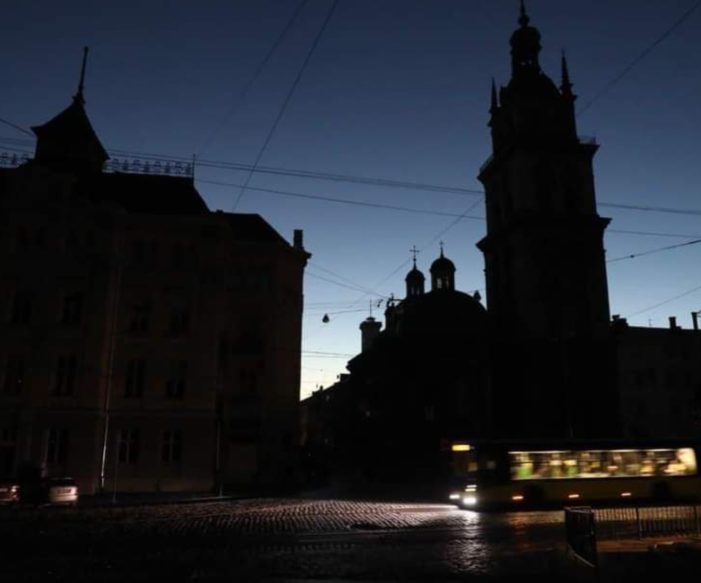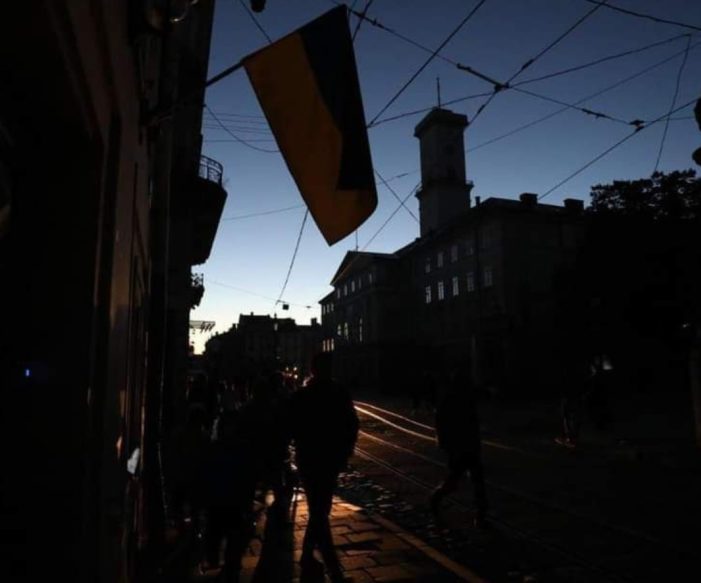“It is bloody hell,” Yana Korniyenko yelled, “I hate Russians so much.”
She was talking to me on the phone from the subway. I could not hear her well, the connection kept being interrupted, and there was a low roar from the hundreds of people around her.
Yana is a Kyiv resident. She experienced firsthand one of Russia’s biggest attacks on civilians in Ukraine on Oct. 10, 2022. On that Monday, Russia launched 84 missiles and 24 drones against Ukraine in addition to 92 shots from multiple rocket launcher systems.
“I was home when the air alert went off,” Yana recalled, “It was early in the morning, and I did not pay much attention right away. I went to the corridor as I usually do when the siren starts hoping to get some work done.”
“Then, I heard the blasts,” she added.
KYIV UNDER ATTACK
Yana, 27, quickly realized the scale of the attack on her home city. She saw tweets from her friends about blasts across the city, and she heard the explosions herself. Her boyfriend, who works as a cultural curator in one of the city’s galleries, was in downtown Kyiv. She called him, but could not reach him. The line was busy.
“I freaked out,” Yana said, “What calmed me down was that I could reach my parents to make sure they were safe. I hoped that their district would not be a target because it takes forever for my grandparents to reach a shelter.”
Yana stayed in the corridor during the explosions. When the noise died down, she rushed to the subway and stayed there for a few hours until the air siren was turned off. The alert that morning lasted more than five hours. During that time, she managed to reach her boyfriend, who was in another subway station closer to downtown.
“The subway was packed,” Yana said, “At first, people were really confused and scared. But after a while, the usual Ukrainian behavior started coming back. People got calmer, even cracked some jokes, and everyone was very nice and cooperative.”
“I, too, tried to be as collected as possible but my blood was boiling,” she recalled, “I was so mad. I still am. God, I hate Russians so much.”
“It is similar to a scooter, but it’s actually a drone,” Yana said, “We recognize that sound now.”
Yana’s alma mater, Taras Shevchenko University, was one of the targets of the bombing. The park in front of it has been badly damaged as well as many tourist and historic sites across the capital. A pedestrian glass bridge that overlooked downtown was also targeted.
“I honestly don’t get the Russians,” Yana continued, “They targeted lots of our electricity grids, but they also wasted half a billion dollars to terrorize our cities, children’s playgrounds, places of no strategic importance. What do they gain from this?”
Yana left the underground after the sirens stopped and checked on her family. Her friends and relatives were safe although many of them had to rush to the closest basement when they heard a weird whirring noise. “It is similar to a scooter, but it’s actually a drone,” Yana explained, “We recognize that sound now. They buzz on the streets before we can actually see them.”
Russia attacked Kyiv the next day, Oct. 11, 2022, as well as the following week, when it once again launched mass strikes against Ukraine’s civilian infrastructure. About 30% of Ukrainian electricity systems have been destroyed. Ukraine uses its electricity for heating and has also been exporting it to the EU. Now, many cities are experiencing temporary shutdowns because the remaining electricity grids cannot keep up with the energy demand.
“The first attack scared me. Then, on the next day, I was more prepared,” Yana proceeded, “And when Russians struck again this week, I was completely organized and collected. I donated to our army to buy more drones a few days ago, I wear comfortable shoes, and I believe in our soldiers.”
She tries to spend less time in the city center, but she has no intention of leaving Kyiv. “I am not okay with these attacks, but I am staying here,” she concluded.
LVIV IN THE DARK
The city of Lviv in Western Ukraine has been under fewer attacks than many other places closer to the frontline. Due to its greater distance from the Russian border, the city has been able to carry out a nearly normal existence throughout the nine months of the Russian invasion. It hosts around 200,000 internally displaced people, is a major logistical center for arms deliveries from the West, and also treats many wounded soldiers and civilians.
Then on Oct. 10, 2022, Lviv went dark.


Russian rockets damaged crucial electrical infrastructure as well as heating stations. Public transport, such as trams and trolleybuses that feed off the electricity grid, became paralyzed. The connection was lost, so people could not call or connect to the Internet.
“We got electricity late in the evening,” Marianna Mavdryk, a Lviv resident, told me, “But that depended on the district. Ours is farther from the city center, so everything was restored a bit faster as there was less damage.”
Marianna, 28, was born and raised in Lviv. She lived in the central district for most of her life, and last year, she moved to an area further away with her boyfriend. Her mother, a social worker, still stays in their downtown apartment, which was dark until the early the morning of the day after the attack.
“I heard blasts, and I did not understand what was going on,” Marianna said, “It was my mom who called me to check if I was okay while there was still some connection on the line. She told me to get somewhere safe immediately. I told her I was home, and I went into the underground parking lot. I left when the air siren was off.”
“It was my first time in the shelter, actually,” she continued, “I used to ignore the alarms before because I did not expect anything major. Many people in our area did that, too. You just want to keep on living.”
Marianna works in fashion. A few days before the strike, she returned to Lviv from France where she attended Paris Fashion Week.
“It feels surreal to be here, under the sirens, when I was in safety only a few days ago,” she added, “That attack was an apocalypse materialized.”
Marianna recalled a noise, a whirling trembling sensation, and the loud bang from an explosion.
“I am really lucky it didn’t happen where I was because I was completely frozen for a bit,” the woman said, “If it was not for my mom’s call, I would not know what to do. You learn about this, but then, in crises, you cannot always act.”
Marianna and her boyfriend spent the night in their house and did not sleep in the basement, but they did move to the corridor for safety. On the next day, Lviv was attacked again, although on a smaller scale. And 30% of the region surrounding the city remained without electricity. A week after the initial attack, there was one more, and many electricity grids were destroyed beyond repair. So the government asked people to conserve electricity and reduce their device usage.
“I am trying to be very economical, so I did not charge my phone and laptop, and I will not use any electric heaters for a while,” Marianna said, “I am very upset about this, but it’s life.”
The woman returned to work the day after the attacks ended as the city was able to fix most of the damaged infrastructure. She is still mindful of her energy usage and keeps her apartment rather chilly, but she maintains a normal life besides that.
“I am more alert now, and I get that there will be more terrorizing,” Marianna said, “My boyfriend and I went to a big market after the attacks, and we bought tons of stuff to help us for the winter such as thermal underwear, dried foods, and more. This is bizarre given that we live in an ancient European city under bombardment in the 21st century, but I cannot reflect on that now. I will package those worries for later.”
A PERSONAL EXPERIENCE
My tiny village, about a 50-minute drive from Lviv, was under attack, too. Needless to say, nobody expected it. The village — a suburb of a nearby town of 30,000 residents — is home to about 1000 people. It is a quiet residential area with cute houses and big gardens.
On Monday morning, Oct. 10, 2022, that village experienced a major blast that shook nearby windows. It felt like an earthquake, and it was extremely loud. People ran to their basements. My cat — completely unaware that there was a war in the country — got terrified and ran for her life until she found safety.
We learned later that it was our electricity grid that was hit. The nearby area had no light and no connection. A cathedral not far from the grid had some minor damage.
Utility workers restored everything in a few hours, but there is a shortage of electricity now as we have to share with nearby districts whose grids were completely destroyed. Our house is colder than usual as we get our heating from electricity, and we want to reduce our consumption.
People are a bit more anxious; they call more often and check regularly on their loved ones who are far away. More attacks are expected.
A large-scale attack took place again on Oct. 17, 2022 with all of Ukraine under air alert. Within two weeks of the initial bombings on Oct. 10, 2022, at least 70 civilians were killed.
Anna Romandash is an award-winning journalist from Ukraine.





















